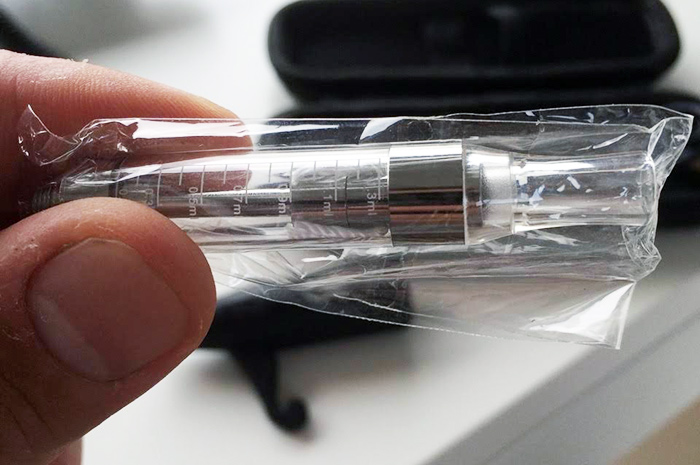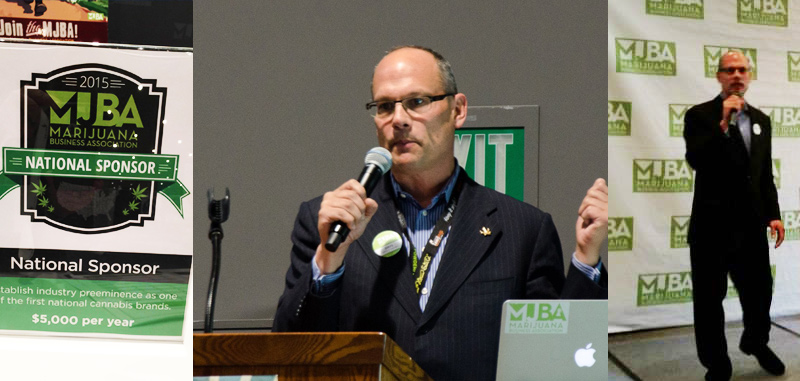 For decades, cannabis prohibition has resulted in secrecy and isolation among growers. When cannabis is illegal, the option of coming out in the open as a cannabis entrepreneur and working with others is not a viable choice. However, as states have passed measures for medical, and more recently, recreational cannabis markets, the industry has been forced to adapt to operating out in the open, which has presented opportunities for those who choose to work together.
For decades, cannabis prohibition has resulted in secrecy and isolation among growers. When cannabis is illegal, the option of coming out in the open as a cannabis entrepreneur and working with others is not a viable choice. However, as states have passed measures for medical, and more recently, recreational cannabis markets, the industry has been forced to adapt to operating out in the open, which has presented opportunities for those who choose to work together.
David Rheins is the founder of the Marijuana Business Association, a national association of cannabis businesses which provides business intelligence, networking, and commercial opportunities to members. Today, David and show host Shango Los discuss the ways that prohibition-era growers and new entrants to the cannabis space can work together, how competition comes into play when cannabis businesses work side-by-side, the differences in how the industry has been accepted by different regions, and how many cannabis growers have decided to take their knowledge and skills to states that are about to legalize.
Listen to the podcast below, or read the full transcript!
Subscribe to the Ganjapreneur podcast on iTunes, Stitcher, SoundCloud or Google Play.
Listen to the Podcast
Read the Transcript
Shango: Hi there and welcome to the Ganjapreneur.com podcast. I am your host Shango Los. The Ganjapreneur.com podcast gives us an opportunity to speak directly to entrepreneurs, cannabis growers, product developers, and cannabis medicine researchers, all focused on making the most of cannabis normalization. As your host I do my best to bring you original cannabis industry ideas that will ignite your own entrepreneurial spark, and give you actionable information to improve your business strategy, and improve your health, and the health of cannabis patients everywhere.
Today my guest is David Rheins. David Rheins is founder of the Marijuana Business Association. A national association which provides business intelligence, professional networking, and commercial opportunity for participants in the legal cannabis industry. David also publishes the popular MJ Headline News on Facebook, MJNewsNetwork.com on the web, and Marijuana Channel 1 on YouTube. David has been a Senior Executive at Rolling Stone, SPIN, iVillage, Corbis, Time Warner, and American Online. Welcome David.
David: Welcome Shango, thank you for having me.
Shango: Glad you could make it. You know, cannabis producers have historically worked alone in the dark, and you’re taking on the idea of bringing them together into an association. What advantages can coming together in a business association offer for these folks?
David: As our old friend Hillary Clinton said, “It does take a village.” In any new industry the industry has needs to address, in terms of common standards, and viability, technology, but certainly within legal cannabis where we have a very neigh sense compliant level. The notion that any one sole provider could do it alone is pretty daunting.
The reality is that you need to be part of an industry association, so that you can one, get the business information and intelligence you need to make those decisions. Two, to build the community to get to know who the players are within your local space, and because this has been subterranean, even though you may be in close proximity, you might not know some valuable associates in your own home town. Three, you’re always looking for opportunity, which is every changing in dynamic.
Shango: Are you finding that the people who are drawn to being involved in association are more, I don’t know, I guess I’ll say new school, recreational producers, where they have come from another industry that is more familiar with doing associations. Versus, prohibition era or heritage growers who are more practiced at being in the dark, and working alone to do things. Do you find that it’s more one than the other?
David: Interesting question. The reality is that I believe many of those cottage industry, or heritage growers, had straight jobs as well, and so they were familiar with being part of a union, or participating in the Boy Scouts, or in the Farmer’s Cooperative. Indeed, many medical patients and providers have organized along collective lines, so the notion of a collective or social approach to building the industry, or business needs, is nothing new for those of us in the culture.
Certainly those folks who were in more established industries have the privilege every major American, indeed every major industry, has not only one, but multiple industry associations to address those various concerns. Some are focused on lobbying, some are focused on technology, some are focused on cultural or business issues, some are local or regional. I believe the notion of collective intelligence and associative value is something that’s pretty inherent in all of us.
Shango: I think that’s a really interesting point that you make that even though these people may self-identify as a prohibition era, or heritage grower, or whatever, artisan grower, that most of these folks had day jobs.
David: That’s correct.
Shango: Most of the folks were not full time growers, and so they both identify as the grower, but also have the work experience of somebody who’s going to work. That’s an interesting point. Let’s talk a little bit about competition, because a lot of growers compete on lots of different levels for the highest THC, to get the particular clone cut first, Cannabis Cups for sure. How does that play out at the association level when where you’re bringing these people together for a common goal, but they are natural competitors?
David: Great question. I like to call the term co-opetition. Again, I think it’s something that’s not unique to cannibis, it’s pretty common in any emerging marketplace, Indeed as a marketing discipline we’re always taught that first you have to sell the industry, and then your place within the industry. For participants in the legal cannabis industry, whether that’s medical, or commercial, or soon industrial hemp, all of them are facing not only legal challenges.
As I suggested earlier one cannot as an individual impact the legislative or law making practice, but if we organize along interest groups, if we develop cooperative organizations, if we stand together and represent the economic might of an emerging industry. Then politicians and policy makers, and business leaders, and the world world pays attention to us. I think both from the legal standpoint, but then again in terms of competition, we’re in such a young industry. That if you’re a grower, or a processor, or a dispenser, or a retailer, or even a service provider, what you’re vending the products and services that today you vend, are not going to be the same products services that you vend tomorrow.
Technology’s changing, consumer demand is manifesting, many new brands and products are coming on the marketplace. It’s less about building market share, or your own piece of the pie, and more about the fight to, what I call the normalization of the industry. Being accepted on Main Street, so that we can get bank accounts, that we can get real estate, so that we can get the kinds of financial and logistical support for our businesses. That’s a social hurdle, as much as it is a legal or technological, and social hurdles must be addressed collectively.
Shango: It sounds like the first step is just surviving, and you’re right. Before people are necessarily, you even going to have the energy to compete with each other. Like oh my gosh, can we work together to just be allowed to use the banks?
David: That’s right. The art of that is how do we address the regulators, how can we get, here in Washington, the Liquor Control Board, and Liquor Cannabis Board now. Or how can we get the Department of Financial Institutions, or how do get the Washington Bankers’ Association to sit down with us to talk about what best policies, how to interpret the COLE Memo, how to interpret Federal Guidelines, or FinCEN restraints. To operationalize those so that it makes sense in Vancouver, in Bellingham, in Portland, in Denver, each marketplace has it’s own sensibilities, it’s own players. Only collectively, only together can we get those folks to sit down, and work through that last mile of legislation, of regulation, of operational detail.
Shango: I can imagine that some of the growers who have been working in the shadows to protect themselves during prohibition days, yeah some of them might not be used to sharing and cooperating as much. The more I heard you explain your answer I realized that there’s probably a lot of them that are just thrilled to have anybody else to play with in the same sandbox, and they’re actually really excited about associating with others, and coming together.
David: It’s so true. The way that we work at the Marijuana Business Association, my trade association, is that we structure involvement based upon your level of expertise, and where you are in that food chain. If you’re a new business, you come in as a business member. You’re there to learn, you’re there to network, you’re there to participate in the building process. If you’re a corporate, or a national sponsor, you’re a thought leader, so those folks are not marketing their products and services, as much as they are defining best practices and establishing protocols for a scalable, sustainable, viable industry.
One of the exciting things about legal cannabis is that because this was a voter initiative driven revolution, there are no existing policies in place. We get the chance to build the industry intentionally. We get to say hey let’s pay our men and women fair equal wage. Let’s have proper benefits and worker rights. Hey, let’s address things like economic sustainability, environmental sustainability, energy consumption, and being good citizens, so that together we proactively create an industry that will be more readily accepted as prohibition is unraveled, and the industry goes coast-to-coast.
Shango: Those are some very clear advantages for us to be able to kind of reinvent the wheel and start from scratch. We’re going to take a short break here and be right back. You’re listening to the Ganjapreneur.com podcast.
Welcome back to the Ganjapreneur.com podcast. I am your host, Shango Los, and this week we are speaking with David Rheins of the Marijuana Business Association. David, before the break we were talking about the advantages and challenges of bringing together our cannabis community to work together. One of the things that you’re doing that not a lot of folks are doing is working at the national level.
We’ve got regional organizations that are focused more on local needs, but you’re really, you’re doing a lot of time on an airplane going to these different parts of the country, pulling people together, sharing our shared memory, so that everybody can get on the same page. What cultural differences have you seen when comparing these different regions, say between Washington and Colorado and Florida?
David: Thank you, there are quite a few differences. The exciting part about legalization and the way that’s unraveled, is that it is a local phenomenon. You’re talking about state geographies, even within those states, even within Washington state, the difference between western Washington, Seattle, Metro, Downtown, Indoor Grows, Cosmopolitan, and Progressive. With eastern Washington, Spokane, American grade city, Outdoor Grows, Conservative values right on the border of Idaho is distinct.
Now when you start overlaying things like Colorado versus Washington versus Oregon versus New York or Florida, cultural sensibilities are extreme. I believe on the west coast the general, and these are obviously oversimplifications, but the general culture is much more progressive and permissive. The marijuana industry, obviously medical marijuana started in California in ’96. Washington followed with its legislation in ’98. You have several decades of experience, a culturization, here on the west coast. That makes it less of a social hurdle to overcome.
Indeed, I think pot smoking in general is more permissive in Seattle than it is in Denver, for example.
In Denver, the culture of the cannabis community, against are oversimplifications, but is less activist, less cultural, and more investor, and entrepreneurially driven.
Shango: That’s interesting, so what you’re…if we gave it down to brass tacks, what you’re describing is in Seattle if you’re outside at an event, or a club, or anything, people feel pretty free to go outside and go ahead and smoke a joint on the street. Knowing that they’re probably not going to get in trouble, even though it’s actually against the law. Are you saying that folks inside the club, or whatever event, would be less likely to come out on the street in Colorado?
David: Absolutely. In fact, as an example of that, here in Seattle we did have one over exuberant cop who early on issued a number of citations for public consumption of marijuana, even though it’s only a misdemeanor infraction. He wrote on those tickets the name of the City Attorney, Pete Holmes. It made the newspapers, because Pete Holmes and the police department suspended the cop temporarily and overturned those. Indicating to everyone that public consumption of marijuana, or marijuana use was the lowest priority on the force.
In Colorado, conversely since legalization, they have written tens of thousands of infractions at significant fines. They are actively looking for people who are smoking pot on the street, tourists who buy, and targeting them for ticketing. That’s culturally not nearly, and you certainly do not have their City Attorney is not the first one at line at the Seattle, or at his pot store buying weed, as Pete Holmes did at Cannabis City. Culturally night and day.
Shango: Let’s compare a different dynamic. Instead of comparing Washington and Colorado, let’s compare a legalized state to a not-legalized state. Those of us who have had the opportunity to do medical marijuana for more than a decade, and recreational for a year or more, the amount of intellectual property know-how, and cultural comfort with normalization is astounding in legalized states compared to states where it’s not legal yet. As far as like skills sets where folks knowing how to do extraction, folks knowing how to discuss CBD, things like that. What are you seeing between the states that are fully legalized versus the states that you go to where they’re just trying to get their legislation passed?
David: That right, one could argue that nowhere are we fully legalized. The reality is that we are still battling vestiges of prohibition on the state level, and full enforcement of prohibition on the federal level, even in Washington, even in Colorado. Certainly, so there is no real normalization. I believe that the biggest victim of prohibition from a business point of view is the lack of information is the constraint on intellectual property. We are just at the beginning of sharing information about things as simple as the usages of hemp.
Hemp, obviously, the country was founded on hemp, we have many, many, many more years growing hemp in this country than we do not growing hemp. Yet, because the last 50 years we’ve not been able to grow it, there is no institutional knowledge in terms of, or no innovation in terms of how do you grow hemp, the cultivation and the science of it. Much of what we know anecdotally or what we may have discovered in the medical marijuana circles is now just being validated through traditional science. In fact, that’s one of the last crutches of the prohibitionist, is that more science and research is needed.
I believe that the level of information is scant everywhere, even in places like the west coast where it has been more than a decade of folks commercially cultivating and growing the plant. Only now with the first crack of legalization can we really drill down, and the innovation that we’re seeing in things like solvent lifts. Extracts, or growing technologies, or energy efficiencies, are just now coming out in a major way, as money and legitimacy have allowed traditional business people and scientists to now get involved.
Shango: Are you seeing when you go to these states that are still working to get their legalization legislation passed, starting from other states where it’s already bill starting this. For example, I have some friends here who when our 5052 passed, which folded in medical into our recreational system, they just pulled up stakes and they moved to Michigan. They said, “You know what? Michigan’s going to be coming online soon, and the intellectual property in my head is worth so much more in Michigan than it is in Washington now.” They’re moving, so are you seeing folks doing that?
David: I’ve seen that all over. Hot spots are places where like Illinois, where it was $100,000 for your application, or New York where it was $250,000, or Nevada where it was very expensive as well. Where big money interests have purchased, or acquired the licensing, but there is no expertise. On east coast, the early New Jersey dispensaries had trouble with their crops, because they did not have the level of grow expertise that we enjoy here on the west coast. Indeed, you’re seeing your experience, your intellectual property, particularly on these first couple of years as those industries are coming online, are very, very desirable.
You don’t have to move. You referenced Washington and the migration of medical into recreational, or commercial as I like to call it, many of those medical participants are not necessarily getting a license, but just going to work with companies who will service those markets. Their experience, and their know-how is extremely valuable.
Shango: Thanks David. We’re going to take another short break and be right back. You are listening the Ganjapreneur.com podcast.
Shango: Welcome back to the Ganjapreneur.com podcast. I am your host Shango Los. This week we are speaking with David Rheins of the Marijuana Business Association. David, a lot of the folks in the different states that have found themselves legalized are starting to move towards unionization. The cannabis workers are coming together to be able to negotiate with their employers as a group. Some folks are really in favor of that, and some folks just don’t want anybody negotiating for them at all. As somebody whose running a national association of cannabis businesses, I bet you you’re seeing a lot of this first hand. What are you seeing in the different states, and how are the businesses responding to it?
David: Businesses in the marijuana industry, in the cannabis industry are a pretty broad lot. It’s hard to characterize one prototypical grower, or processor, or dispenser, or retailer. The reality is that we are a diverse group, and just as there are folks who are pro-union, and folks who are “pro-business” in tradition industry, you’re seeing that same spectrum and diversity within cannabis. I believe most of what you’re seeing as we characterize the Green Rush, are entrepreneurial types, and so I think the natural predilection and experience is to do everything yourself. They’re being schooled as their businesses grow, as the marketplace get significant in methodologies, and tactics, and techniques for managing that organizational growth.
As you add people, as you add organization, as you add systems, the management of that becomes quite challenging. How to manage the HR function, and whether or not workers of weed should ignite or unite, is certainly a controversial one. You’ve got advocates and folks who think that’s not such a good idea.
Shango: That’s a good point about all the growing pains that our scene is going to go through as it coalesces into one thing. One of the things that I noticed a lot is you’ve got folks that consider themselves medical. People who are growing and producing products specifically for patients. Then what many call the recreational market, but you said before the break and I really liked that, you called it commercial which takes out some of the stigma of just recreational, so we’ll call it the commercial market.
Sometimes these two groups, the medical and the commercial, they don’t play together all that well. What have you seen across the country as far as the integration of the ideals and quality products of medical as it bonds itself with this new and unproven commercial market?
David: It’s a great question, it’s really at the crux of the challenge culturally within the cannabis community. Up to this point we’ve been talking about the acclimation, or the integration of cannabis community normalizing into our mainstream society. Really within the cannabis community you have some distinct segments. The medical advocate consumer, or grower, or patient, has very distinct reasons and passions for being in the industry. Most of them are very personal, they start with their personal medical condition, or someone they love, and therefore, get into in a real emotional way.
Many of the so-called commercial entrants have more economic opportunities in mind, and a cultural sympathy, if you will. What we’re finding is that initially there’s a lot of skepticism, those folks in medical, particularly because of the lack of information. Mainstream media’s doing a poor job of covering what’s going on. Mainstream business media even worse. There’s a lot of misinformation and misinformation breeds mistrust. Many of the patients or medical providers feel like the greed heads have come in and taken over the industry, that for years for they’ve fought for no money or at great personal risk, and now are being pushed aside and not being appreciated.
Many have been taught that what you find in the recreational retail stores is a sub-quality, higher priced, lesser quality product that doesn’t meet the needs of patients. There are some real concerns, and then there are misnomers. What we’re seeing actually as Colorado is now a year and half, and as Washington is just passed it’s one year anniversary of being operating retail outlets, is that there is a rationalization of pricing, so the cost is coming down. The wholesale costs are coming in line. The products are starting to evolve, so that even through the commercial or recreational stores you’re able to get CBD product, you’re able to get now topicals and other products that can be used in a medical way.
Here in Washington, and in Colorado, and in Oregon, they’re moving towards the notion of greater education, so that there will be channel over-the-counter, if you will. I believe that medical marijuana will be integrated into the medical system that we have here, our healthcare system in the states, and that means there will a change in product. It will have to go through the FDA. There will be testing, and there will be larger players involved, which means that that culture of the collective, the dispensary, as being the center place of medical marijuana will go away.
Shango: Let’s hope that the evolution of the medical in the commercial market happens swiftly to everyone’s benefit, both patients and commercial folks alike.
David: I think it is happening much more rapidly than we’ve thought. Two years ago when we first started the MJBA meet ops, as we were going around and meeting with all the folks who were entering the industry, and those who had been in the industry for some time. There was a great deal of skepticism that we would we would even be able to get the first stores open. That we would ever be able to get government to allow us to grow thousands of tons of cannabis, to package and sell that cannabis widely.
Now, a year later you’ve seen hundreds of millions of dollars of sales. You’ve seen a hundred million plus dollars in new tax revenues coming in, and it’s only accelerating. What you’re seeing is an industry that’s being formed pretty rapidly, and medical marijuana and the public attitudes around medical efficacy have never been stronger. Something like 80 or 90% of the public supports it. You’ve seen things around. PS, post traumatic stress disorder, being recognized that cannabis is efficacious. Things like epilepsy, where you’ve got the Sanjay Guptas and the mainstream media, the Epilepsy Foundation advocating for legal cannabis.
You’ve got mainstream politicians appearing at marijuana conventions who are advocating for medical marijuana. Medical marijuana has passed the sniff test in terms of the public recognizing that cannabis is a powerful plant that can be used for many, many things, which is the first thread in the unraveling, and the rescheduling of cannabis.
Shango: David, thank you for sharing your experience with us. From the frontlines I appreciate having you on the show.
David: Thank you Shango. I really appreciated it, and if anyone has any information, or they’d like more, please check us out at JDA.net, or MJHeadlineNews.com.
Shango: David Rheins is founder of the Marijuana Business Association. You can find the Ganjapreneur.com podcast on the Cannabis Radio website. You can subscribe to the podcast in the Apple/iTunes store, you can listen and read interview transcripts on our home website at Ganjapreneur.com. Thanks as always to Brasco for producing the show. I am your host Shango Los.






















 For decades, cannabis prohibition has resulted in secrecy and isolation among growers. When cannabis is illegal, the option of coming out in the open as a cannabis entrepreneur and working with others is not a viable choice. However, as states have passed measures for medical, and more recently, recreational cannabis markets, the industry has been forced to adapt to operating out in the open, which has presented opportunities for those who choose to work together.
For decades, cannabis prohibition has resulted in secrecy and isolation among growers. When cannabis is illegal, the option of coming out in the open as a cannabis entrepreneur and working with others is not a viable choice. However, as states have passed measures for medical, and more recently, recreational cannabis markets, the industry has been forced to adapt to operating out in the open, which has presented opportunities for those who choose to work together.


